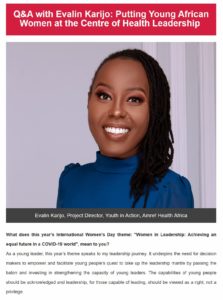
The Africa Health Agenda International Conference (AHAIC 2021) hosted by Amref Health Africa took place virtually from 8 to 10 March 2021 with the theme “Decade for Action: Driving Momentum to Achieve UHC in Africa.” With over 3,000 participants, the conference raised critical strategies, lessons, and opportunities to achieve Universal Health Coverage (UHC) in Africa. Kenyan President Uhuru Kenyatta opened the conference, outlining priorities for achieving UHC. World Health Organization (WHO) Director-General Dr. Tedros Adhanom Ghebreyesus also discussed the importance of achieving UHC and the role of multi-stakeholder partnerships in the continent.
Below are some highlights from CSEM’s engagement in this year’s AHAIC.
In the first session, the AHAIC Commission launched the State of UHC in Africa report. The Commission consisted of 11 members from 10 countries in Africa. With inputs from a range of stakeholders, experts and community voices, the report takes stock of the progress made on UHC in the continent, and identifies challenges and opportunities. The report also provides recommendations to accelerate progress toward UHC, including re-orienting health systems and health system priorities to respond to population health needs, and prioritizing and strengthening primary health care as the foundation for UHC.
At the launch event, UHC2030 Co-Chair Gabriela Cuevas Barron emphasized the critical role of political will in UHC, especially noting the need for more legislation at the country level, clear national targets and budget allocations for UHC. Ms Cuevas Barron, a parliamentarian from Mexico and the Honorary President of the Inter-Parliamentary Union, also referred to recommendations from UHC2030’s State of Commitment to Universal Health Coverage report on strengthening accountability and transparency for the UHC agenda. See more Day 1 highlights in the AHAIC newsletter.
 On the second day of the conference, CSEM Advisory Group Member Evalin Karijo (Director of Y-ACT Youth in Action, Amref Health Africa) moderated a townhall on women’s leadership in the health sector. The speakers discussed how to pave way for more women, including through policies and legislation for gender equality as well as expanded upskilling opportunities. Ms. Karijo also discussed this topic in a pre-conference newsletter and spotlighted the importance of youth leadership in Africa. See more from Day 2 in the AHAIC newsletter.
On the second day of the conference, CSEM Advisory Group Member Evalin Karijo (Director of Y-ACT Youth in Action, Amref Health Africa) moderated a townhall on women’s leadership in the health sector. The speakers discussed how to pave way for more women, including through policies and legislation for gender equality as well as expanded upskilling opportunities. Ms. Karijo also discussed this topic in a pre-conference newsletter and spotlighted the importance of youth leadership in Africa. See more from Day 2 in the AHAIC newsletter.
The plenary on Day 3, “Our Health, Our Rights: UHC and Accountability for All,” discussed accountability and human rights in the context of the progress to UHC. Speakers included CSEM Advisory Group member Dr Esther Njoroge (Vice President, Smile Train) along with Dr Anastacia Tomson (LGBT health rights activist), Dr Susanna Weissbacker (Takeda Pharmaceuticals), Mah-Sere Keita (African Society for Laboratory Medicine), Julienne Lusenge (Congolese Women’s Fund), and Marie Rose Nguini Effa (African Parliamentary Forum on Population and Development). Dr Njoroge noted the joint advocacy civil society organizations can do for UHC accountability, describing CSEM’s efforts in the lead-up to the UN High-Level Meeting on UHC in 2019. The plenary conversation also included the impact of COVID-19 on access to health for marginalized communities, and the need to acknowledge the legacies of racism, sexism and colonialism in Africa’s health systems. See more from Day 3 in the AHAIC newsletter.
The AHAIC conference brought together government officials, private sector representatives from across the health sector, experts and community representatives for a wide range of conversations on UHC in Africa. From technology and innovation for health systems to community engagement and equity in leadership, the sessions presented various opportunities to strengthen health systems to achieve UHC.
As Dr. Githinji Gitahi, Global CEO, Amref Health Africa and former UHC2030 Co-Chair, noted in his closing, 1 in 5 people in the world will be African by 2050, making it all the more important for the continent to accelerate investments to achieve health for all.

